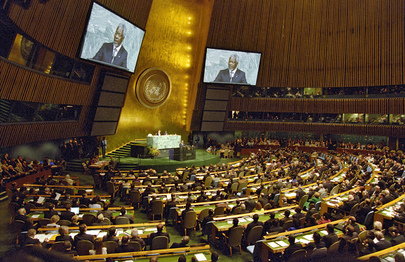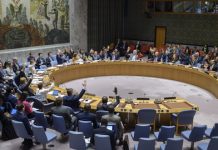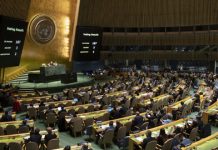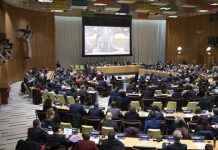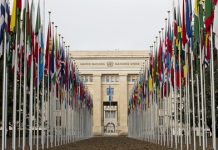Gaza ceasefire could boost aid deliveries to 600 trucks per day: WHO
Amid reports that Israel’s security cabinet has given the green light to a ceasefire deal with Hamas, the UN World Health Organization (WHO) expressed cautious optimism on Friday over the potentially major boost to aid relief in the devastated enclave.
“The target is to get between 500 and 600 trucks in per day over the coming weeks,” said Dr Rik Peeperkorn, WHO representative in the occupied Palestinian territories (OPT).
This would represent “a huge increase” from the 40 to 50 lorries reaching Gaza in recent months and be similar to the level of aid reaching Gaza before war erupted on 7 October 2023, drastically reducing relief deliveries.
Speaking from Jerusalem, the WHO medic described the ceasefire announcement as “a sign of hope” but warned that the challenge is massive and daunting, because of chronic and severe shortages of food, fuel and medical supplies.
Plans are in place for deliveries to begin on Sunday, Dr Peeperkorn said, adding that the UN health agency has ordered “temporary prefabricated clinics and hospitals” to complement existing facilities, helping to expand bed capacity and address urgent needs.
Sudan: deadly ethnic violence on the rise, warns UN rights office
War in Sudan has become “even more dangerous” for civilians with an increase in ethnically motivated violence, the UN Human Rights office (OHCHR) said on Friday.
Just last week, at least 21 people including children were killed in Al Jazirah state in two attacks which reportedly targeted the Kanabi, a historically marginalised group of mainly African tribes.
The violence coincided with the Sudanese Armed Forces recapture of state capital Wad Madani.
Here’s OHCHR spokesperson Ravina Shamdasani in Geneva:
“Retaliatory attacks of shocking brutality on entire communities, based on real or perceived ethnic identity are on the rise, as is hate speech and incitement to violence. This must urgently be brought to an end. In three videos received by our office that document scenes of violence, including unlawful killings, victims were dehumanized and denigrated.”
Ms. Shamdasani said that the videos reportedly filmed in Wad Madani showed men in SAF uniforms “visibly present”. Summary executions were hailed by perpetrators as a “cleaning operation”, she added.
In another incident in the city of Omdurman, located in the neighbouring state of Khartoum, 120 civilians were reportedly killed and more than 150 injured in drone attacks on 13 January, allegedly launched by Government troops on a market.
The UN rights office has also highlighted “serious concerns” for civilians in North Darfur and warned of the “horrific toll” of ethnically motivated attacks by the SAF’s rival, the Rapid Support Forces (RSF) and its allied Arab militias against African ethnic groups.
OHCHR has called on the warring parties to ensure the protection of all civilians and underscored the importance of impartial and transparent investigations.
Dignity for migrants should be our guiding light, insists ‘Cabrini’ actress
Film star Cristiana Dell’Anna travelled to Geneva on Friday to highlight her film about the age-old dangers confronting migrants and the astonishing Italian missionary who worked in the slums of New York at the turn of the last century, trying to protect them.
The film, Cabrini, is inspired by the true story of Italian nun, Mother Francesca Cabrini, who Pope Leo XIII tasked with helping vulnerable migrants arriving in the United States at the turn of the last century.
It offers an uncomfortable front row view of the discrimination and racism reserved for poor Italian migrants, who were unable to speak English in the already booming city and whose dark skin led to them being called “monkeys”.
Despite serious lifelong sickness, Mother Cabrini took in orphans, fed, clothed and educated them in New York. She was canonized for her work in 1946 – the first US citizen to be made a saint.
Ms. Dell’Anna said that the film is an opportunity to raise awareness about the difficulties migrants continue to face:
‘Where does the migrant stand today in a world where we – it’s easier to trade merchandise and it’s easy for things to travel around the world rather than human beings?’ We should probably reflect on these issues and understand where we place humankind compared to objects.”
Latest UN estimates indicate that there are at least 281 million migrants worldwide, a number that has increased over the past five decades, with people continuing to leave their homes – driven by poverty, conflict and climate change.
Daniel Johnson, UN News
Don’t forget that you can hear more news and interviews on the UN News audio hub now.
Music composed and produced by Joachim Harris. All rights reserved
Source of original article: United Nations (news.un.org). Photo credit: UN. The content of this article does not necessarily reflect the views or opinion of Global Diaspora News (www.globaldiasporanews.com).
To submit your press release: (https://www.globaldiasporanews.com/pr).
To advertise on Global Diaspora News: (www.globaldiasporanews.com/ads).
Sign up to Global Diaspora News newsletter (https://www.globaldiasporanews.com/newsletter/) to start receiving updates and opportunities directly in your email inbox for free.


